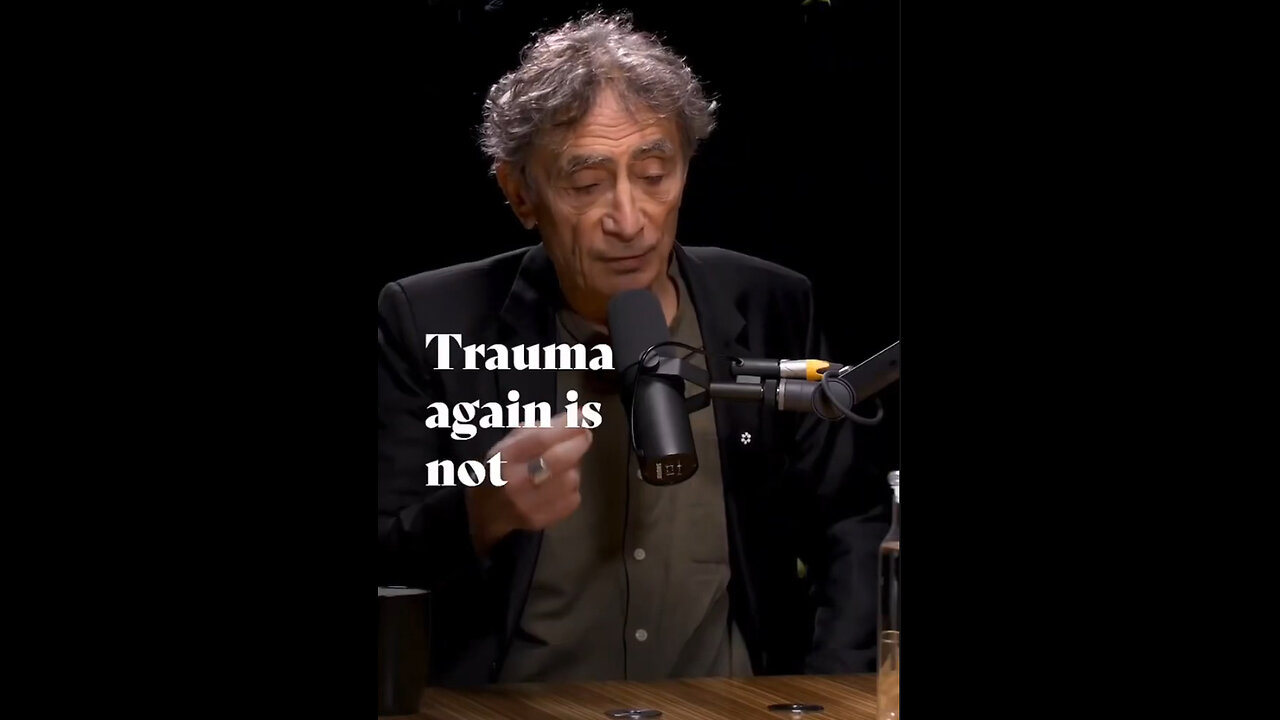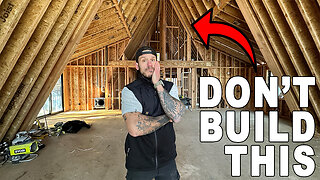Premium Only Content

**Unlocking Trauma: Gabor Maté’s Revolutionary Path to Healing Without Big Pharma**
Welcome to a new era of healing. Forget the sedatives, the antidepressants, the endless prescriptions lining the shelves. If you’re looking for radical, mind-blowing insight into why you—yes, you—are stuck in cycles of illness, addiction, anxiety, and chronic disease, Dr. Gabor Maté is here to shake the foundations of everything you think you know about health. His work isn’t just a critique of the medical system, it’s a direct assault on the profit-driven, symptom-masking, and trauma-ignoring approach that Big Pharma has pushed for decades. Maté goes beyond symptom relief and digs into the root cause of suffering, and guess what? It’s not about bad genes or bad luck. It’s about trauma.
We’re not talking about a few bad memories or unfortunate childhood events. No. Maté identifies trauma as the systemic, psycho-emotional wound that all of us carry—and, until we heal it, it will manifest as physical disease, mental health problems, and self-destructive behaviors. In other words: You can’t fix the body without fixing the soul.
So buckle up. Here’s a deep dive into Gabor Maté’s 6 Revolutionary Principles for Healing Trauma and Disease Naturally, including hard-hitting practices and exercises that will leave you questioning every mainstream medical narrative you’ve ever been spoon-fed.
1) Modern Medicine is Flawed: A War on Wholeness
Let’s face it—modern medicine is broken. It treats disease like it’s some isolated malfunction in your body, completely ignoring the mental and emotional roots of illness. The pharmaceutical-industrial complex thrives on pushing pills for quick fixes, ignoring the deeper causes of what’s really making us sick: unresolved trauma, emotional stress, and a toxic environment. Maté believes the current system’s obsession with mind-body separation and profit-driven overprescription is keeping us in a state of perpetual illness, creating a revolving door of disease rather than healing.
Maté’s revelation? Chronic diseases like cancer, autoimmune disorders, ADHD, and addiction are NOT genetically predetermined. They are the body’s desperate response to unresolved psychological and emotional wounds. Ignoring trauma is like building a house on a shaky foundation—eventually, it will collapse, and when it does, it’s often too late to fix the structure.
Revolutionary Practice: The Inner Inventory
Before you even think about addressing physical symptoms, take a step back. Write down the most significant emotional events of your life, especially from childhood. Identify patterns of emotional suppression—times you felt overwhelmed, neglected, or disconnected. The goal is not to relive these moments, but to acknowledge them, because unresolved trauma can shape your entire biology.
Exercise:
• Step 1: On one page, write down your major health issues or patterns of illness.
• Step 2: On the opposite page, write down significant emotional upheavals in your life. Don’t think too hard; write whatever comes to mind.
• Step 3: Draw connections between these two columns. Notice where suppressed emotions may align with physical illness.
2) A Toxic Culture: We’re All Sick in the Same Way
Our society is toxic. From social isolation, consumerism, the overemphasis on success, to disconnection from nature, we are all part of a culture of trauma. Maté argues that we are constantly bombarded with messages of inadequacy, and in a world obsessed with productivity, competition, and superficial connections, it’s no wonder our mental and physical health is crumbling. Addiction, anxiety, and depression are not signs of individual weakness but are symptoms of a sick society.
Revolutionary Practice: Detoxing from Social Conditioning
• Fast from social media for 7 days. This isn’t just a casual reduction; cut it off entirely. During that time, notice what comes up emotionally and mentally. Pay attention to any feelings of inadequacy or loneliness. This is the withdrawal from a culture of toxic comparison.
• Reconnect to nature for at least 30 minutes daily, no distractions. Your nervous system is biologically programmed to heal in the presence of the natural world, yet most of us spend our lives in artificial environments.
3) Emotional Suppression Equals Disease: The Cancer of the Soul
One of Maté’s most provocative statements is that cancer is often a physical manifestation of suppressed emotions. The science is catching up—chronic stress and unresolved trauma wreak havoc on the immune system, hormonal balance, and cellular health. The body becomes a battleground of unexpressed emotions, which morph into physical diseases over time.
Chronic illnesses like fibromyalgia, heart disease, and cancers are silent screams of trauma buried within. Maté links emotionally repressed people—those who “play nice,” avoid conflict, and are always giving to others at their own expense—with higher rates of chronic illness.
Revolutionary Practice: The Release Ritual
Create a safe space where you can express your deepest, unprocessed emotions:
• Step 1: Sit with a journal and write uncensored for 10 minutes about what you’re really feeling—rage, sadness, fear—don’t hold back.
• Step 2: Scream into a pillow, cry, or move your body in a way that feels like releasing trapped energy. Let your emotions physically release.
• Step 3: Rest. Allow your body to integrate this new emotional release without judgment.
4) Mind-Body as a Unified System: Biology of Emotion
Maté’s radical premise is that thoughts and emotions are not just mental experiences—they are biochemical events that have a direct effect on your body’s physiology. Neuroscience, psychology, and immunology all back this up. Your nervous system, immune system, and hormonal system are intricately connected to your emotional state. Emotions are physical.
Revolutionary Practice: Somatic Awareness
Next time you feel emotional distress, don’t push it away—locate where it exists in your body. Notice if your stomach tightens, your chest constricts, or your throat closes. This is your body speaking to you, and ignoring it only exacerbates the trauma.
5) Holistic Healing Practices: Trauma Must Be Released
Maté promotes somatic therapies, psychedelic-assisted therapy, and compassionate inquiry as powerful healing modalities. These methods do what traditional talk therapy often can’t—they bypass the conscious mind and dive directly into the body’s memory of trauma. Somatic experiencing allows trauma stored in the body to be released through physical movement and breath, while psychedelic-assisted therapy (with substances like ayahuasca or psilocybin) has been shown to dissolve the ego and access the deep unconscious, where healing can truly begin.
Revolutionary Practice: Somatic Release through Breathwork
• Step 1: Sit in a comfortable space where you won’t be disturbed.
• Step 2: Inhale deeply through your nose for 4 seconds, hold for 4, and then exhale through your mouth for 8 seconds. Do this continuously for 10 minutes.
• Step 3: Allow your body to move spontaneously. Don’t control it. Shake, stretch, or allow tears to flow if necessary.
6) Emotions as Medicine: The Power of Compassion
Maté states that the human nervous system is designed to heal itself, but only in the right environment. Healing doesn’t come from repression or suppression—it comes from compassion. Compassionate awareness of your emotional and physical pain allows your body to activate its self-healing mechanisms. This involves more than intellectual understanding—it requires embodying compassion.
Revolutionary Practice: Compassionate Mirror
Look at yourself in the mirror for 5 minutes. Say the words “I see you, and I’m here for you.” Repeat this until you begin to feel a shift in your nervous system. The goal is to feel compassion towards yourself in a way that releases the tension within your body.
Blow Your Mind Conclusion: Reclaim Your Sovereignty
This is not just about healing trauma; it’s about taking back your power from a medical system that profits off your pain. Gabor Maté’s work goes beyond disease—it’s about understanding that you are the creator of your reality, and that healing is a byproduct of reclaiming the parts of yourself you’ve been forced to abandon.
Healing trauma is the most revolutionary act you can undertake because it requires confronting the system—not just the external medical and social systems but the internal systems of suppression and emotional avoidance that have controlled your life.
You are not broken.
You are healing. And now, you have the tools. Use them.
-
 0:53
0:53
FragmentsOfTruth
1 day agoODIT: Examining the On-Device Interception Tool and Its Implications
66 -
 28:15
28:15
Degenerate Plays
13 hours ago $0.91 earnedTwo Birds' Secret Meeting - Gotham Knights : Part 26
42.5K3 -
 12:29
12:29
Mr. Build It
5 days agoWish I Knew This Before I Started Building It
43.1K15 -
 2:03:57
2:03:57
Megyn Kelly
2 days agoNew Trump Derangement Syndrome, and How CNN Smeared a Navy Veteran, w/ Piers Morgan & Zachary Young
143K177 -
 10:05
10:05
DIY Wife
3 years agoHow We Flip Old Furniture For Profit!
76.3K58 -
 2:14:54
2:14:54
TheSaltyCracker
11 hours agoTrump Goes Gangster ReeEEeE Stream 01-26-25
171K334 -
 4:42:13
4:42:13
Due Dissidence
20 hours agoTrump Calls To "CLEAN OUT" Gaza, Swiss ARREST Pro-Palestine Journalist, MAGA's Hollywood Makeover?
78.3K101 -
 2:02:20
2:02:20
Nerdrotic
12 hours ago $20.31 earnedDECLASSIFIED: JFK, MLK UFO Immaculate Constellation Doc | Forbidden Frontier #089
97.5K17 -
 3:00:14
3:00:14
vivafrei
20 hours agoEp. 248: "Bitcoin Jesus" Begs Trump! Rekieta Gets Plea Deal! Pardons, Deportations, Bird Flu & MORE!
216K246 -
 3:44:06
3:44:06
Rising Rhino
19 hours ago $14.53 earnedWashington Commanders Vs Philadelphia Eagles: NFL NFC Championship LIVE Watch Party
102K4